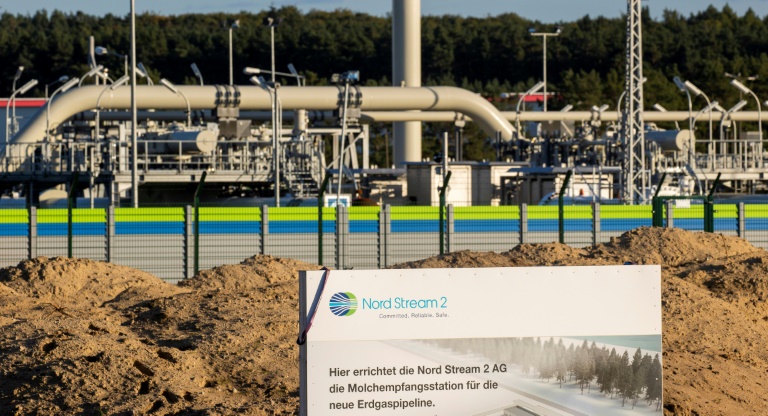The soon-to-be-completed Nord Stream 2 pipeline, set to double natural gas supplies from Russia to Germany, has long divided European capitals and fuelled tensions with Washington.
As US President Joe Biden readies for a landmark encounter with Russia’s Vladimir Putin, here’s a look at the project described by the United States as a geopolitical security risk but also a “fait accompli”:
– What is it? –
Running from Russia’s Baltic coast to northeastern Germany, the underwater, 1,200-kilometre (745-mile) long Nord Stream 2 follows the same route as Nord Stream 1, which was completed over a decade ago.
Like its twin, Nord Stream 2 will be able to pipe 55 billion cubic metres of gas per year to Europe, increasing the continent’s access to relatively cheap natural gas at a time of falling domestic production.
Russian giant Gazprom has a majority stake in the 10-billion-euro ($12 billion) project. Germany’s Uniper and Wintershall, France’s Engie, the Anglo-Dutch firm Shell and Austria’s OMV are also involved.
– Why is it controversial? –
Nord Stream 2 bypasses Ukraine’s pipeline infrastructure, depriving the country of around a billion euros annually in transit fees and, Kiev fears, removing a key check on potential Russian aggression.
Ukraine, in conflict with Russia since Moscow’s 2014 annexation of Crimea, also believes Nord Stream 2 will be used by Russia to exert political pressure.
In past disputes with Russia, Ukraine has seen its gas supply cut off several times.
The United States shares those concerns. As do several European nations, particularly Poland and eastern European countries wary of becoming too reliant on Moscow for energy security.
Analysts meanwhile disagree about Nord Stream’s economic and environmental benefits.
A 2018 report by German think tank DIW said the project was unnecessary and based on forecasts that “significantly overestimate natural gas demand in Germany and Europe”.
– Why is Germany so keen? –
Russia and Germany insist Nord Stream 2 is a commercial project.
Europe’s top economy imports around 40 percent of its gas from Russia, and believes the pipeline has a role to play in Germany’s transition away from coal and nuclear energy.
Former chancellor Gerhard Schroeder, who is close to Putin, serves as chairman of the Nord Stream’s shareholders committee.
A major test came at the start of the year when Chancellor Angela Merkel resisted fierce pressure from Washington and Brussels to abandon the pipeline following the jailing of Kremlin critic Alexei Navalny.
“One gets the sense that Berlin’s enthusiasm for the pipeline has sharply waned, but no one in authority is prepared to halt it,” Steven Pifer, a former US ambassador to Ukraine and analyst with the Brookings Institution, wrote in a recent report.
Germany’s Green party, expected to be part of the next coalition government, is against Nord Stream.
– American U-turn? –
Like predecessors Barack Obama and Donald Trump, Biden objects to Nord Stream 2, calling it a bad deal for Europe and a security risk.
But critics like to point out that the United States is also looking to boost sales of liquefied natural gas (LNG) to Europe, which costs more than Russian gas.
US sanctions on Russian vessels laying the pipeline in recent years have succeeded in delaying Nord Stream 2, angering Germany.
But Biden, eager to rebuild transatlantic ties after Trump, in May unexpectedly waived sanctions on the Russian-controlled company behind the project.
Analysts saw the move as an olive branch to Berlin, whose support Washington is counting on to face other challenges, including a rising China.
US Secretary of State Antony Blinken later called the completion of Nord Stream 2 a “fait accompli”.
– What’s next for Ukraine? –
Ukrainian President Volodymyr Zelensky said the sanctions waiver was a win for Putin.
“Nord Stream 2 is not an economic project. It poses a serious threat,” Zelensky said.
Reaffirming support for Ukraine, Biden has invited Zelensky to the White House in July.
Observers say Washington may now shift its focus towards working with Germany on limiting the Nord Stream fallout on Ukraine.
German Foreign Minister Heiko Maas has already offered to broker talks on extending Gazprom’s gas transit contract with Ukraine.
Under the current agreement, Gazprom has to pay transit fees until 2024, even if it stops using Ukrainian pipelines.










